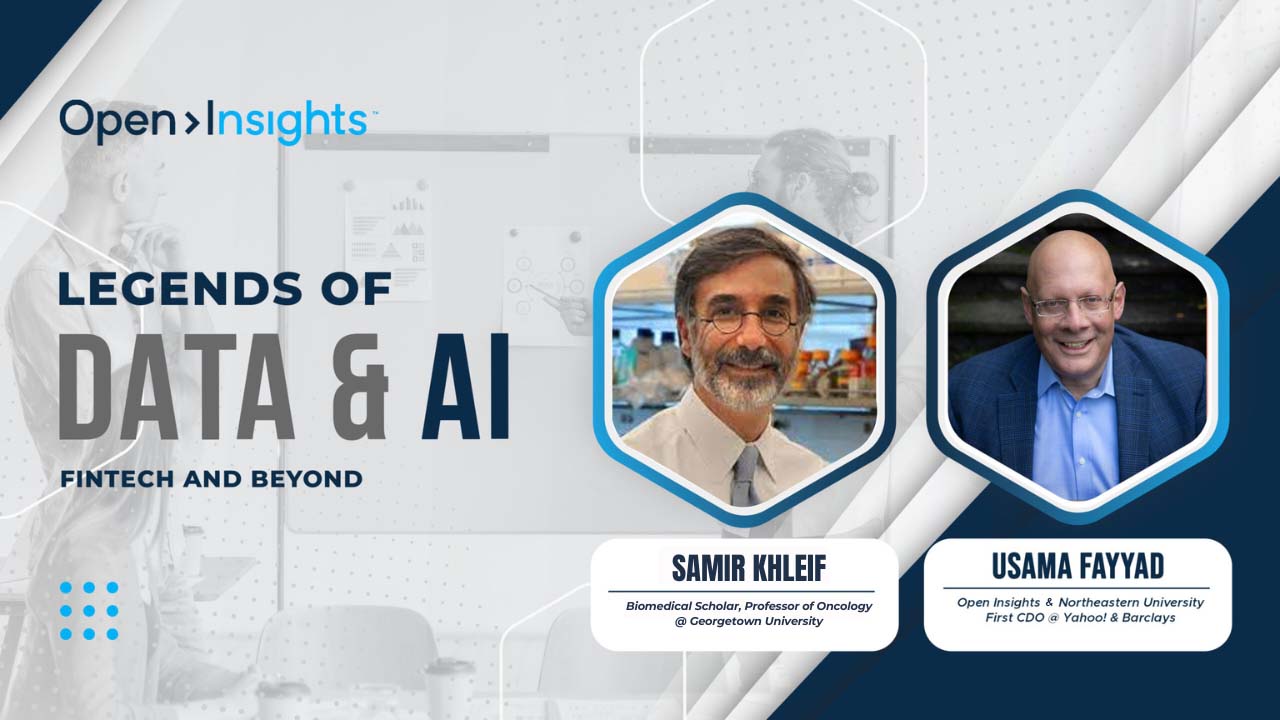
Usama Fayyad speaks with Samir Khleif – Biomedical Scholar, Professor of Oncology @ Georgetown University. Tune in to hear Samir discuss the current role of AI in cancer therapeutics, and his views on how AI will help in developing drugs in the future.
 Samir Khleif :
Samir Khleif :
As we tackle these problems of understanding cancer, immune systems response, and therapeutics: how have computational approaches been a game changer to historically manual approaches to analysis of specimen? How do we build trust in an AI approach – most AI is dependent on the data you feed it and the efficacy of modeling data depends on seeing situations that we have seen before. How do you know when a situation is new or different and hence the AI or predictive models should be questioned?
“We talk about at least thousands of different points of interaction that could lead to the development of cancer, and that’s short of even thinking about how we approach therapy. When we approach therapy it’s not about one hit and one disease, we need to start thinking about the whole elements of interactions to come up with a potential solution, and at this stage we’re not there yet.”
Dr. Khleif, MD is an immunologist and immune therapist. His research program is ”translational tumor immunology” focused on understanding mechanisms through which the immune system and cancer cells interact and how to overcome tumor tolerance in developing therapeutic approaches. Specifically, his research interests include developing novel immune therapeutics, cancer vaccines and delineating the mechanisms of resistance to immunotherapy. Prior to transferring his research program to Georgetown University in 2017, Dr. Khelif served as the Director of Georgia Cancer Center, Augusta University. As Director of the Georgia Cancer Center, Dr. Khleif oversaw the development of a large integrated program of basic scientists and clinicians merging the Cancer Center strength in immunology, inflammation and tolerance basic science and immune therapy. Dr. Khleif was an intramural NIH scientist for about 20 years. While at NCI, he also served as a leader of the Cancer Vaccine Section, leading a nationally active Immune Therapy Program. His laboratory has conducted some of the earliest clinical trials in antigen vaccines and was the first to conduct vaccines against mutant oncogenes. Also, in the past few years some of the discoveries made in his laboratory have been translated into first-in-human immune therapy clinical trials. Furthermore, Dr. Khleif has published several studies on the mechanisms of tumor-induced suppression in animal models and have overcome such inhibition by developing strategies that have been translated into clinical trials. His laboratory has developed models to understand how different kinds of immune therapies can be combined to work synergistically and translated into clinical trials.
 Usama Fayyad :
Usama Fayyad :
Usama joined Northeastern University Khoury College of Computer Science as Professor of the Practice, and the Office of the Provost as the Inaugural Executive Director of the Institute for Experiential AI. He continues as Chairman of Open Insights, a company he founded as a technology and consulting firm in 2008 after leaving Yahoo! to enable enterprises to get value out of their data assets and optimize or create new business models based on the new evolving economy of interactions. Leveraging open source, bigData technology, and strategic consulting, Open Insights deploys data-driven solutions to grow revenue from Data assets through BigData strategy, new business models on data assets, and deploying data science, AI/ML solutions. Usama served (2017-2019) as Co-Founder & CTO at OODA Health, Inc a VC-funded company aiming to liberate the healthcare system from administrative waste by leveraging AI/automation to create real-time/retail-like experience in payments in healthcare.
From 2013-2016 Usama served as Global Chief Data Officer & Group Managing Director at Barclays Bank in London, after launching the largest tech startup accelerator in MENA following his appointment as Executive Chairman of Oasis500 in Jordan by King Abdullah II in 2010. His background includes Chairman & CEO roles at several startups, including Blue Kangaroo Corp, DMX Group and digiMine Inc.
He was the first person to hold the Chief Data Officer title when Yahoo! acquired his second startup in 2004. At Yahoo! he built the Strategic Data Solutions group and founded Yahoo! Research Labs where much of the early work on BigData made it to open source and led to Hadoop and other open source contributions. He has held leadership roles at Microsoft (1996-2000) and founded the Machine Learning Systems group at NASA’s Jet Propulsion Laboratory (1989-2005), where his work on machine learning resulted in the top Excellence in Research award from Caltech, and a U.S. Government medal from NASA.
Usama has published over 100 technical articles on data mining, data science, AI/ML, and databases. He holds over 20 patents and is a Fellow of both the AAAI and the ACM. Usama earned his Ph.D. in Engineering in AI/Machine Learning from the University of Michigan, Ann Arbor. He has edited two influential books on data mining/data science and served as Founding Editor-in-Chief on two key journals. He also served on the boards/advisory boards of private and public companies including: Criteo, Invensense, Exelate, RapidMiner, Stella.AI, Virsec, Silniva, Abe.AI, NetSeer, Choicestream, Medio, Leap Year Technology, Drover, and others. He served on the advisory boards of the Data Science Institute at Imperial College, AAI at UTS, and The University of Michigan College of Engineering National Advisory Board. He serves on the Board Advisory Committee to Nationwide Building Society in the UK and on the Advisory board of the WEF Global Center for Cybersecurity. He is an active angel investor/advisor in many early-stage tech startups across the U.S., Europe and the Middle East.
Watch on YouTube!
Listen on Spotify!



.svg)
.svg)
.svg)


